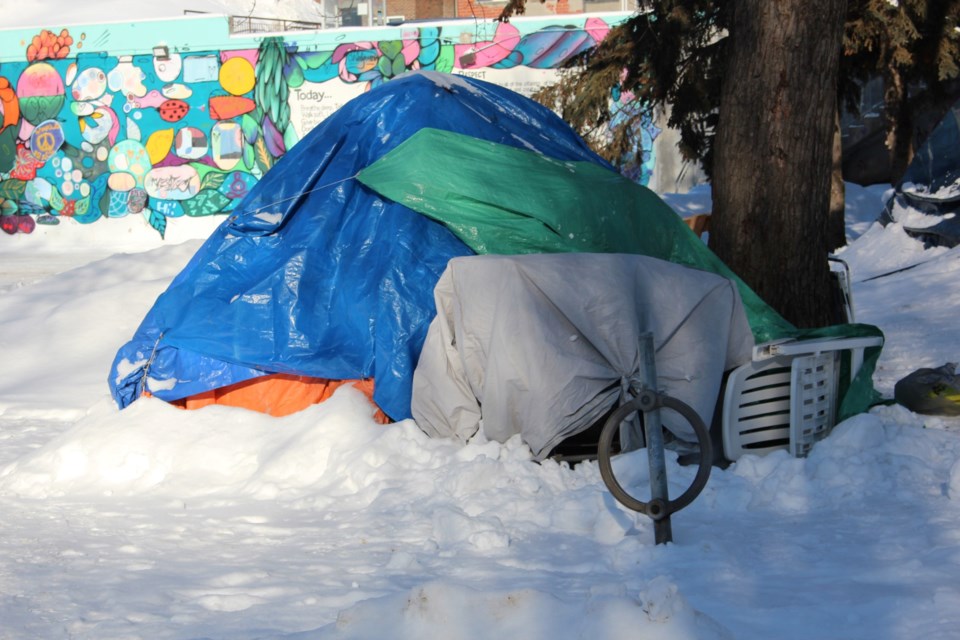The Ford government will be tabling legislation on Thursday meant to end homeless encampments in Ontario.
It will come with additional funding for municipalities and a warning: if the province doesn’t get the results it’s looking for, it will take further action, the housing minister said Monday.
"If we don't see the results of those investments, then the legislation will highlight further actions that we can take," said Paul Calandra. "We expect — and the premier has been very clear on this — we think parks are for kids to have fun in there, where parents go, where grandparents bring their grandkids. Our downtowns are supposed to be places where small businesses thrive and prosper."
The province funds homelessness prevention and some social services through service managers across the province at the city, regional or county level.
Calandra's forthcoming bill will include what he described as "very precise actions that will provide service managers the opportunities to work with the province to ensure that we can take action on encampments," he said.
Increased funding will be announced before the legislation passes, which Calandra said he expects won't be until the new year.
However, he expressed some frustration about how money flowing through service providers has been spent so far.
"Look, I've got $1.2 billion on the table right now and significant additional resources in Toronto, and we're still seeing the same results over and over and over. And I think the people of the province of Ontario agree with us that they're done," he said, referring to funding the province has provided through the Homelessness Prevention Program. "They want to see people with mental health and addictions see more wraparound services, and they want their parks and their streets back, and we're going to deliver for them."
Calandra wouldn't say what the "further actions" may be before the bill is tabled.
Last week, the premier outlined his plans for the legislation in a letter to a group of mayors who'd formally asked him — at his urging — to pass legislation to dismantle housing encampments and expand the use of involuntary mental health and addictions care in Ontario.
The forthcoming legislation will include "greater service manager accountability and alignment with provincial and local priorities" and "accountability measures to ensure these funds support dismantling encampments," Ford wrote.
The bill will also "explicitly and unequivocally (prohibit) the use of illicit drugs in public, with new tools and authorities to help police enforce this prohibition" and contain "enhanced penalties for people who deliberately and continually break the law," Ford wrote.
He also promised "new approaches to treatment and rehabilitation that prioritize pathways to recovery over incarceration in the cases of minor and non-violent drug-related crimes."
Ford wrote that he expects the bill will be Charter-compliant, but if it is found not to be, he will use the Charter's notwithstanding clause to defend it. He also committed to getting involved in court challenges municipalities face when dismantling encampments.
Ford's opponents said they're concerned that the government will clear encampments without ensuring the people living in them have somewhere to go.
"What Doug Ford is proposing is a heavy-handed approach," NDP Leader Marit Stiles said. "At the end of the day, if you don't have places for people to go, you can't arrest your way out of this crisis."
Liberal Leader Bonnie Crombie said she also wants to see encampments cleared but noted that half of Ontario's big city mayors did not sign the letter asking Ford for stronger legislation because they were worried that it would result in heavy-handed measures from the province.
"It's not OK to clear people from the streets without somewhere to put them that is safe and where they'll be getting the help and the treatment that they need," she said.
Crombie said the issue is personal to her, as her biological father struggled with addiction, was in and out of shelters, and passed away at Toronto's Seaton House shelter.
"I thank the Seaton House and the counselling he received each and every day," she said. "Those are the kinds of programs that are needed."
Green Leader Mike Schreiner said the long-term solution to homeless encampments is deeply affordable housing with wraparound supports, and the interim solution is providing hotel rooms to homeless Ontarians along with mental health and addictions workers.
"But it shouldn't have had to get to this point — if we actually had a government that would invest in housing, we wouldn't be in the crisis that we're in today," Schreiner said.
Thursday, when the government plans to table the bill, is the last scheduled legislative sitting day of the year. The house is not scheduled to sit again until Feb. 18, 2025.
Ford has refused to rule out holding an early election next year, and both Crombie and Stiles said they believe that's what the bill was about.
"They've had six years, and now at the 11th hour, they want to have an early election come springtime and show people that they're finally doing something," said Crombie. "There's a lot to do. Where have they been for six years?"
Stiles said she believes the government has no intention of actually passing the bill and agreed with a reporter's suggestion that an election could be called before that happens.




.png;w=120;h=80;mode=crop)